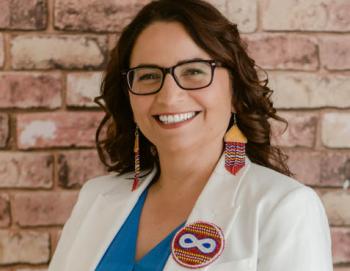Image Caption
Summary
Local Journalism Initiative Reporter
Windspeaker.com
The candidate endorsed by outgoing Métis Nation of Alberta (MNA) president Audrey Poitras to “continue to build on (her) legacy”, after 27 years in the position, and transition the MNA into its new configuration as the Otipemisiwak Métis Government has won handedly.
Andrea Sandmaier from Cold Lake outpaced her opposition Joe Pimlott from Calgary by a margin of more than two-to-one votes.
Sandmaier says she’s “pretty excited and very honoured” to be elected president to lead the new government.
In voting that took place online, by mail and in person from Sept. 13 to Sept. 19, Sandmaier drew 5,693 votes to Pimlott’s 2,131.
“We can see from that that…the momentum…from the constitution ratification and now to the election, our citizens are very engaged and want to keep moving forward. So I was very happy with the high turnout of voters,” said Sandmaier.
However, the 8,167 ballots cast and accepted—a number that does not take into account spoiled ballots—is almost half of the 15,729 voters who took part in the November 2022 ratification of the new constitution.
The vote for the constitution took place over the entire month of November, points out Sandmaier, while the vote for the new officers of the Otipemisiwak Métis Government was over the course of a single week.
Along with the president, there are two other provincial officers and both positions were acclaimed. Tai May Grauman will serve as women’s representative and Rebecca Lavallee is the youth representative. Under the new governance structure, there is no vice president.
As for the elections for district captains and district representatives, 14 positions were acclaimed and 15 held elections. Deadline for nominations in some districts had to be extended.
Under the new governance structure, local and regional councils are replaced by district councils and any assets held by the local and regional councils are transferred to the district councils.
“When I look at the list of the acclaims, I mean, of course we wish there would have been an election in those districts. And people unfortunately didn't put their name forward. But the people that have been acclaimed are very, very qualified,” said Sandmaier.
“We have a lot of young people that put their name forward that are very smart and wanting to move the nation forward. So I'm just fine with the way things have turned out with the election.”
The members of the new government will be sworn in during a ceremony on Oct. 15.
“There's a lot of work to do with the transition from our last governance structure to our constitution and our new structure, so it's going to be a very busy few weeks here. Well, probably four years with everything that's going on,” said Sandmaier.
As for relationships with other Métis entities in Alberta, Sandmaier says that she, like her predecessor Poitras, wants to build bridges.
Dissension has been voiced by the Métis Settlements General Council (MSGC) and court action is underway. The MSGC contends that the Otipemisiwak constitution seeks to have the Otipemisiwak Métis Government representing all Métis within Alberta, including the Métis that are represented by the MSGC.
The Fort McKay Métis Nation has expressed its opposition to Bill C-53, the Recognition of Certain Métis Governments in Alberta, Ontario and Saskatchewan and Métis Self-Government Act, introduced in the House of Commons in June.
In a brief presented to the Standing Committee on Indigenous and Northern Affairs Sept. 5, Fort McKay recommended the committee reject the bill until the federal government amended the underlying self-government and implementation agreements “to ensure they respect the constitutionally protected rights of Métis communities in Alberta, who, like Fort McKay, have rejected being governed by the Métis Nation of Alberta or a single regional Métis government.”
Sandmaier says she’s not concerned with Fort McKay’s opposition to the bill as the legislation “doesn't affect any other Indigenous group. It's about us. It's about our governance structure, our elections.”
The Métis Nation of Ontario is also facing strong opposition from the First Nations chiefs in that province against the proposed legislation. Chiefs contend that the Métis are trying to lay claim to both land and citizens from First Nations. Our most recent article on that here: https://windspeaker.com/news/windspeaker-news/ontario-chiefs-rally-turn…
Windspeaker.com reached out to Pimlott for comment on the election results but did not hear back from him by deadline.
During the election, Pimlott accused Prairies Economic Development Canada Minister Dan Vandal of siding with Sandmaier after a photo was posted of Sandmaier and Poitras with Vandal at Métis Crossing.
Vandal’s office said the visit had occurred before the candidates officially declared and MNA chief electoral officer Del Graff said that nothing in the Elections Act prohibited the MNA provincial council from remaining active.
Local Journalism Initiative Reporters are supported by a financial contribution made by the Government of Canada.

